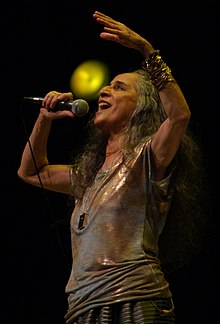Maria Bethania
| Maria Bethânia | |
|---|---|

Bethânia performing in Rio de Janeiro, 2012
|
|
| Background information | |
| Birth name | Maria Bethânia Viana Telles Veloso |
| Born |
June 18, 1946 Santo Amaro da Purificação Bahia, Brazil |
| Genres | Bossa nova, MPB, samba |
| Occupation(s) | Musician |
| Instruments | Vocal |
| Years active | 1960s–present |
| Labels |
RCA Records Wrasse Records(Europe) |
| Associated acts |
Gilberto Gil Caetano Veloso Nara Leão |
Maria Bethânia Viana Telles Veloso (Portuguese pronunciation: [maˈɾiɐ beˈtɐ̃niɐ]; born June 18, 1946), known by her stage name Maria Bethânia, is a Brazilian MPB singer. Born in Santo Amaro, Bahia, she started her career in Rio de Janeiro in 1964 with the show "Opinião" ("Opinion"). Due to its popularity, with performances all over the country, and the popularity of her 1965 single "Carcará", the artist became a star in Brazil.
Bethânia is the sister of the singer-songwriter Caetano Veloso and of the writer-songwriter Mabel Velloso, as well as being aunt of the singers Belô Velloso and Jota Velloso.
The singer has released 50 studio albums in 47 years of career, and is among the , having sold more than 26 million records.
Bethânia is the sixth out of eight children born into the family of José Telles Veloso (Seu Zeca), a government official, and Claudionor Viana Telles Veloso (Dona Canô), a housewife.
The name Maria Bethânia was chosen by her brother Caetano Veloso after the homonymous hit song written by composer Capiba and famous at the time in the voice of Nélson Gonçalves.
In her childhood, she had aspirations to become an actress. However, her mother was a musician, so music was prevalent in the Veloso household. Though Bethânia was born in Santo Amaro da Purifição, her family moved to Salvador, Bahia when she was 13. The move allowed her to experience the bohemian, intellectual circles of the city as well as to visit theaters. When she was 16, her brother Caetano Veloso invited her to sing in a film for which he was producing the soundtrack, but she refused. Nevertheless, the film's director, Álvaro Guimarães, liked her voice and invited the young musician to perform in the 1963 Nélson Rodrigues's musical Boca de Ouro. This time Bethânia accepted, and for the first time in her life she went on stage to sing for an audience, opening the play performing a samba by Ataulfo Alves.
...
Wikipedia
